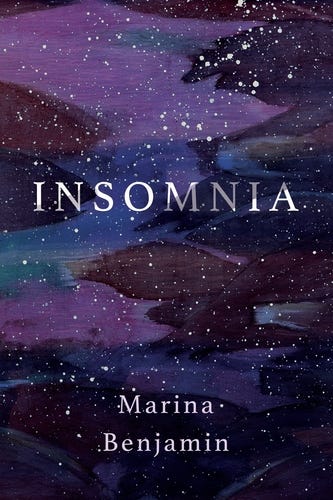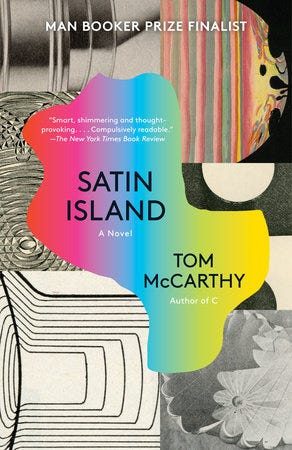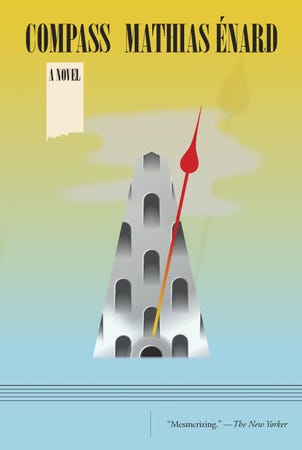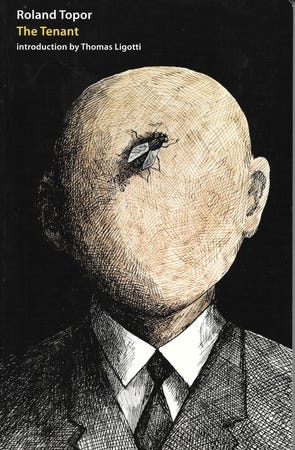Marina Benjamin, author of “Insomnia,” recommends literature thats toys with unreliability
When I’m deep inside a writing project I have no time to read for pleasure. All my reading is about shoveling in fuel to power the work in progress. With Insomnia I decided to let my gut lead the way, which is how I came to end up feeding (at first, largely unconsciously) a psychic itch that expressed itself in an attraction to unstable narrators. Time and again, I’d find myself drawn to books where the narrative “I” qualified not so much as unreliable as deformed, handicapped from the start, or squished out of shape at some significant originary moment in the story. I was intrigued by the various ways in which a narrator’s reasoning got derailed or was uncomfortably pinched, or strayed down strange pathways, or was painfully present one moment, before dissolving. In such books, the author’s interest, whether primarily formal or made to subserve some other end, lies in manipulating the reader’s sense of what is real and what hallucinated. Although I’m generally not fond of being manipulated, when the stage-managing is achieved on the quiet and the effect is more like a seduction, I’m game.

Of the works I read while writing Insomnia, I loved the extreme and increasingly deluded subjectivity that was overlord in Tom McCarthy’s Satin Island, and the commitment to collage-as-method in Charles Simic’s fractured and poetic Dime-Store Alchemist. Mostly, though, I was interested in the perceptual spaces that narrative instability opens up (and plays havoc with), not least because that echoed what was taking place in my insomniac head. Demented with exhaustion at the time, my life had become unwieldy, day and night turned upside down, sense and non-sense intermingling; and there was a fault line of anxiety running through everything. I wanted to write a book that stayed — really stayed — with this unstable state, with difficulty and uncertainty and ambiguity, even if I wasn’t sure I’d last the duration. Plus I didn’t yet know if, whether amid all the instability, it would be possible to remain a trustworthy narrator.
Insomnia eventually emerged as a journey into darkness. It seeks to peer into the abyss — the dark night of the soul, forcing us into a reckoning with our shadow selves, yet it also trips lightly through the lucid experiences of being sleepless, from its edgy, often distorted highs, to the lighting glimpses insomnia gives us into the complexities, and contrariness, of our longings and our urge towards creativity.
Some of the books listed here I read while writing and I think their mark is visible in my book. But I read some of them later, because my head remained in that febrile, slightly fevered mode once I’d finished and I wanted my instability mirrored back at me.

A Box of Matches by Nicholson Baker
Leaving aside the cloying conceit around which the novel is structured (a fire lit every dawn until the last match in the box has been struck), Baker is the laureate of banality. His character’s night-thoughts chunter along like trains (rolling, visceral, mundane: we hear about the Cheerios he eats, the book he’s reading or program that’s on TV), and then they evaporate like steam. Baker evokes the unremitting ordinariness of insomnia through his middle-aged father of two’s pre-dawn mental meanderings. Life, for this character, is small-town good: there is friendship, activity, community. But it’s not good enough. He feels life is passing him by, that all is motion. Baker conjures this mild dissatisfaction very well, but at the same time he seems to be saying that the business of trundling through the everyday, enriching it with hope and memory, is what life is.

My Year of Rest and Relaxation by Ottessa Moshfegh
This intense novel asks what wellness might look like if viewed in a morbidly literal light. Its 20-something narrator, blonde, pretty and bored, ducks out of the world in into herself, aspiring through medication, to achieve round-the-clock sleep. Moshfegh has effectively re-invented neurasthenic confinement for the 21st century, with a narrator who refuses to follow cultural prescription (except when she has blackouts and gets a bikini wax, or goes clubbing), and who is broken by impossible gender expectations, while contemptuous of friends who keep striving to meet them (like Reva, stuck in a joyless affair with a married man, and sucking it up working as an insurance-broker). Yet the best she herself seems able to do is shop online. Because she’s medicated, her grasp of things is often fuzzy. An inner grief is hinted at but never developed, smothered by a talent for acid observation. No one does dark like Moshfegh.

Days of Abandonment by Elena Ferrante
Ferrante is a genius — and in this novel her particular genius is for atmosphere. In charting a wronged woman’s descent into despair and loss of self, she generates so stifling a feeling of urgent, claustrophobic, raging madness that I found myself desperate for her to let me go, even as I was addictively turning pages. The book is darkly comic. In one unforgettable scene, the woman accidentally-deliberately feeds her cheating husband ground glass in his pasta; in another she attempts angry revenge sex with her hapless neighbor, straddling him in his apartment, but then limply wailing about her wretched husband. Ferrante is wonderful at women falling apart, painting the inside of their heads as crazed thoughts whirr, and almost convincing you with their bizarre rationalizations. Taut, tense, and full of very human pathos, Days of Abandonment is a superb study in altered states of being.

Satin Island by Tom McCarthy
McCarthy’s novel follows a corporate anthropologist, known only as U, as he tries to map the way the world is trending for a super-secret mega-project designed to give an anonymous corporation a stranglehold over its competitors. “The Company” pays U handsomely for his consulting work without ever disclosing exactly what his report will be used for; while readers are given no more bearings than U, for whom, without guidelines, anything and everything feels relevant. Cue fascinating digressions on how memes work, on oil spills, parachuting accidents, the pros and cons of remote sex, museology, and much more. There is no plot building here, but McCarthy does build tension and hints vaguely at impending doom – and so while U becomes increasingly convinced he’s close to finding some grand unifying theory of everything, the reader is simultaneously convinced he’s losing his grip. It’s a very smart trick to pull off.

Compass by Mathias Énard
This weighty novel from the internationally-feted author of Zone, is set over the course of a single night, as its sleepless narrator revisits scenes from his academic career while pining for the unrequited love of his life — a protégé who overtook him. The novel consists entirely in reporting past events: their encounters with quirky scholars at European conferences, their late night tête-à-têtes in brasseries, their mutual love for the literature and music of the East, yet at the same time it offers a critique of Orientalism — the collective hallucination of an ‘other’ to set against our understanding of ourselves. Subtextually, Énard intimates, both in language and plot, that insomnia is all about bridge-building: between East and West, day and night, consciousness and the unconscious, and finally, with its persistent regurgitation of painful memories, past and present.

Fight Club by Chuck Palahniuk
Brilliant as it is, the movie (which I came to first) doesn’t dampen the kooky, brazen feel of this book. It still feels fresh to me. Plus the prose drips sleep-deprived mania: “Three weeks without sleep, and everything becomes an out-of-body experience” says the unnamed narrator. In this insomniac phantasmagoria of a book, the reader is kept unsure who is who, and who is real, and whether is happening is or isn’t being dreamed up in the narrator’s hyped-up brain. I prefer Palahniuk’s bleakly comic depictions of support groups for the terminally ill (the narrator, who is not sick, attends them in order to feel something) to the anarchic goings-on around the novel’s eponymous club, where white-collar pen-pushers get beaten to pulp so they don’t walk through life numb, but where the dialogue can lapse into action-movie machismo.

The Tenant by Roland Torpor
A man known only as Trelkovsky rents a top-floor room in a Parisian tenement and is convinced his neighbors — knocking on walls, leaving shit on his doorstep — are out to get him. Waking in torment every night, he wonders at “the fragility of his existence.” Under the covers, he stares wildly at his body, cowering in the gloom, looking massive in its (hypnagogic) proportions. He thinks the room is shrinking: objects move, taps drip, heads thrust themselves through walls and sneer. One morning he wakes up dressed and made up as a woman. A parable of alienation and persecution (as though Torpor were re-working into fiction his real-life experience of Nazi oppression), this chilling tale slips seamlessly beyond the world of nightmare into horrifying supernaturalism.

About the Author
Marina Benjamin is the author of Insomnia, Rocket Dreams (short-listed for the Eugene Emme Award), Last Days in Babylon (long-listed for the Wingate Prize), and The Middlepause (finalist for the Arts Foundation’s Creative Nonfiction Award). She has also worked as a journalist, her pieces appearing in The Guardian, the Financial Times, The Independent, and other British newspapers, and she has served as arts editor at the New Statesman and deputy arts editor at the Evening Standard. She is currently a senior editor at the digital magazine Aeon.


7 Unstable Narrators in Fiction was originally published in Electric Literature on Medium, where people are continuing the conversation by highlighting and responding to this story.
Source : 7 Unstable Narrators in Fiction














